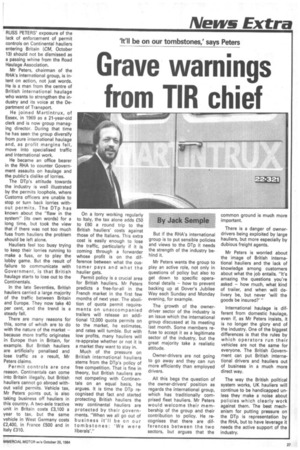be on our tombstones,' says Peters
Page 29

If you've noticed an error in this article please click here to report it so we can fix it.
Grave warnings from TIR chief
RUSS PETERS' exposure of the lack of enforcement of permit controls on Continental hauliers entering Britain (CM, October 13) should not be dismissed as a passing whine from the Road Haulage Association.
Mr Peters, chairman of the RHA's international group, is intent on action, not just words. He is a man from the centre of British international haulage who wants to strengthen the industry and its voice at the Department of Transport.
He joined Martintrux, of Essex, in 1969 as a 21-year-old clerk and is now group managing director. During that time he has seen the group diversify from pure international haulage and, as profit margins fell, move into specialised traffic and international work.
He became an office bearer in the RHA to counter Government assaults on haulage and the public's dislike of lorries.
The DTp's attitude towards the industry is well illustrated by the permits loophole, where Customs officers are unable to stop or turn back lorries without permits. The DTp has known about the "flaw in the system" (its own words) for a long time, but took the view that if there was not too much fuss from hauliers the problem should be left alone.
Hauliers feel too busy trying to keep their lorries running to make a fuss, or to play the lobby game. But the result of failure to communicate with Government, is that British haulage starts to lose out to the Continentals.
In the late Seventies, British hauliers carried a large majority of the traffic between Britain and Europe. They now take 40 per cent, and the trend is a steady fall.
There are many reasons for this, some of which are to do with the nature of the market — because more traffic originates in Europe than in Britain, for example. But British hauliers are artificially penalised and lose traffic as a result, Mr Peters claims.
Permit controls are one reason. Continentals can come into Britain illegally, but British hauliers cannot go abroad without valid permits. Vehicle tax, Mr Peters points out, is also taking business off hauliers in this country. A two-axle tractive unit in Britain costs £3,100 a year to tax, but the same vehicle in West Germany costs £2,400, in France £500 and in Italy £310. On a lorry working regularly to Italy, the tax alone adds £50 to £60 a round trip to the British hauliers' costs against those of the Italians. This extra cost is easily enough to lose the traffic, particularly if it is coming through a forwarder whose profit is on the difference between what the customer pays and what the haulier gets.
Permit policy is a crucial area for British hauliers. Mr Peters predicts a free-for-all in the French market in the first few months of next year. The abolition of quota permit requirements on unaccompanied trailers will release an additional 12,000 quota permits on to the market, he estimates, and rates will tumble. But with low profits, many hauliers will re-appraise whether or not it is a market they want to stay in.
Much of the pressure on British international hauliers stems from the DTp's policy of free competition. That is fine in theory, but British hauliers are not competing with Continentals on an equal basis, he argues. It is time the DTp recognised that fact and started protecting British hauliers the way continental hauliers are protected by their governments. "When we all go out of business it'll be on our tombstones: 'We were liberals'." But if the RHA's international group is to put sensible policies and views to the DTp it needs the strength of the industry behind it.
Mr Peters wants the group to play an active role, not only in questions of policy but also to get down to specific operational details — how to prevent backing up at Dover's Jubilee Way each Sunday and Monday evening, for example.
The growth of the ownerdriver sector of the industry is an issue which the international group discussed at its meeting last month. Some members refuse to accept it as a legitimate sector of the industry, but the great majority take a realistic attitude.
Owner-drivers are not going to go away and they can run more efficiently than employed drivers.
All this begs the question of the owner-drivers' position as regards the international group, which has traditionally comprised fleet hauliers. Mr Peters would welcome their membership of the group and their contribution to policy. He recognises that there are differences between the two sectors, but argues that the common ground is much more important.
There is a danger of ownerdrivers being exploited by large hauliers, but more especially by dubious freight agents.
Mr Peters is worried about the image of British international hauliers and the lack of knowledge among customers about what the job entails. "It's amazing the questions you're asked — how much, what kind of trailer, and when will delivery be, but never 'will the goods be insured?'" International haulage is different from domestic haulage, even if, as Mr Peters insists, it is no longer the glory end of the industry. One of the biggest differences is that the rules by which operators run their vehicles are not the same for everyone. The British Government can put British international drivers and hauliers out of business in a much more direct way.
The way the British political system works, UK hauliers will continue to be handicapped unless they make a noise about policies which clearly work against them. The best mechanism for putting pressure on the DTp is representation by the RHA, but to have leverage it needs the active support of the industry.
































































































































































































































